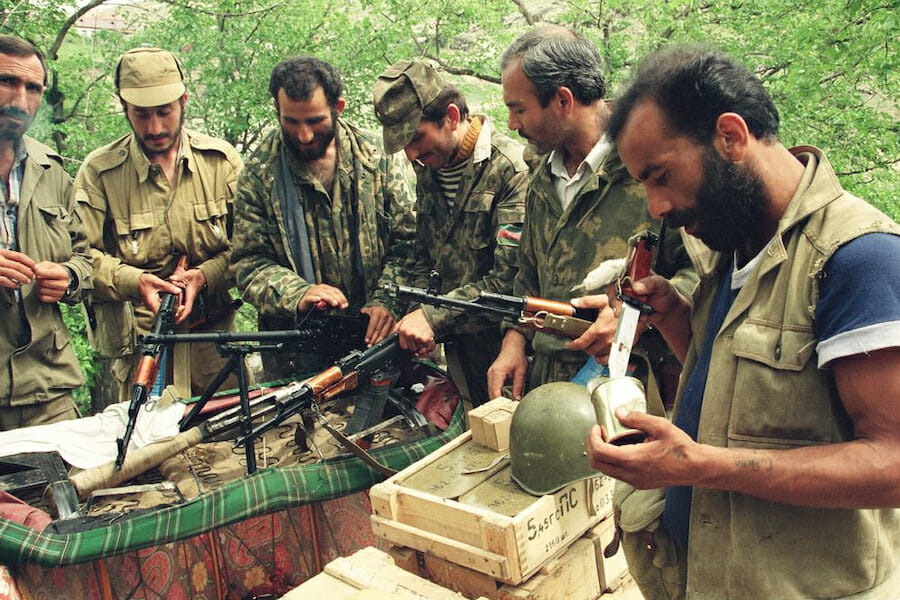
Why are Iranian Trucks in Karabakh?
New footage revealing Iranian-registered trucks and cars transporting fuel and food to occupied Azerbaijani territories is causing major concern within Azerbaijani society. The video shines a light on Iran’s long history of supplying Armenian separatists with vital resources. Although Iran claims to support the territorial integrity of Azerbaijan, Tehran conducts a two-faced policy towards Baku.
Iran’s embassy in Baku tried to refute the presence of Iranian vehicles by issuing a statement that no Iranian registered trucks or cars are involved in transporting fuel and food to occupied Azerbaijani territories. In a phone conversation with his Azerbaijani counterpart, Iranian Deputy Foreign Minister, Abbas Araghchi, denied the trade, accusing “enemies” of spreading false information in order to damage Azerbaijani-Iranian relations. As a matter of fact, Tehran’s two-faced approach in its relations with Azerbaijan is well known and there is significant distrust of Iran amongst Azerbaijanis.
Despite their denial that Iranian trucks are involved in this illegal trade, Iran has a track record of supplying Armenian occupied Azerbaijani territories since the end of the active phase of the 1994 war between Armenians and Azerbaijanis, otherwise known as the Karabakh War. There is substantial evidence of Iranians, under the watch of the government, doing business and trade with the Armenian separatists, conflicting with Tehran’s “official” policy. However, conducting illegal business and trade with the Armenian-occupied Azerbaijani territories is part of Tehran’s multifaceted policy towards Azerbaijan and the West.
Iranian trucks enter the Karabakh region by crossing the state border with Armenia at the Nordooz-Agarak border crossing, traveling north to Goris, then east towards the occupied Lachin district. According to various travelers, including Edward Walker in his No Peace, No War in the Caucasus, there is a small checkpoint along the Lachin corridor between Armenia and Karabakh for the purposes of checking the documents of Iranian truck drivers going to Stepanakert, the capital of the de facto Republic of Artsakh. In his book, Azerbaijan Since Independence, Swedish expert Svante Cornell highlights that from the end of the Karabakh War, Iranian trucks started “supplying most of the needs of the secessionist enclave.” The involvement of Iranians and the presence of Iranian vehicles in business dealings with secessionist Karabakh is briefly mentioned in Tom de Waal’s Black Garden: Armenia and Azerbaijan Through Peace and War. There are many witnesses and examples of the involvement of Iranian trucks in supplying fuel, food, and construction materials to Karabakh, and Iran’s denials cannot hide its close ties with the occupied Azerbaijani territories controlled by Armenia.
Circumventing International Sanctions
In the midst of the global pressure on the Iranian regime, Iranian officials are desperately looking for alternative routes to circumvent sanctions imposed by the United States. Tehran has used Armenia and Armenian banks in the occupied Azerbaijani territories to break the sanctions and facilitate revenue income, just as in the past it tried to create alternative financial channels in Turkey and the UAE. A May 2007 cable from the U.S. Embassy in Yerevan, entitled “Armenia Slow To Implement Bank Sepah Asset Freeze,” said that Sepah, an Iranian bank which has been under UN sanctions since March 2007, maintained correspondent accounts with the Armenian branch of Iran’s Bank Mellat in breach of UN restrictions. In August of last year, the United States sanctioned two Armenian companies for trading with blacklisted Iranian companies.
As Armenia becomes more dependent on Iranian gas and energy supplies, its foreign policy aligned with Moscow and Tehran poses a major threat to Western interests in the South Caucasus and Caspian region. Iranian food and fuel supplies to Karabakh are well known and widely referenced. It is no secret in Armenia, Iran, and Azerbaijan, that Iranian trucks conduct this kind of transportation on a daily basis.
Geopolitical Dimension
When it comes to understanding Tehran’s geopolitical interests in its relations with Azerbaijan and Armenia, Iran conducts two policies – the official one and the pragmatic one in terms of its national interests. Having a large Azeri population in its northern borders, Tehran fears Azerbaijan becoming an active advocate for Iranian Azerbaijanis’ rights within Iran. Iran’s longtime suppression of ethnic minority rights has already created distrust between its ethnic minorities and the centre. Iranian Azerbaijanis are the biggest non-Persian ethnic group in Iran, and after the collapse of the Soviet Union, Iran became concerned at the presence of the independent Republic of Azerbaijan on its northern border, fearing its potential effect on so-called “Azeri irredentism” inside Iran. Therefore, Tehran forged an alliance with Armenia and supports it with regard to the peaceful resolution of the Karabakh conflict.
According to Vardan Voskanyan, an expert on Iran at Yerevan University, the current status quo – meaning the continuation of Armenian control over Azerbaijani lands bordering Iran’s northwestern region – is beneficial for Tehran as it creates a “buffer zone” between Azerbaijan and Iran’s northwestern Azeri populated regions. He also stated that any change of borders or resolution in favour of Azerbaijan is not in the interest of Iran. In other words, Armenian control of Azerbaijani border regions with Iran in Karabakh solves a national security problem for Iran.
Iran-Armenia relations are directed at preventing Azerbaijan from becoming pro-Western and thus close to Washington. Iran cannot tolerate Azerbaijan’s strategic alliance with Israel and has been trying to damage the alliance through a variety of means, including supporting an ethnic Talish separatist organisation based in Moscow, providing moral and ideological support for radical Shia groups inside Azerbaijan in order to destabilise it, and supplying fuel, food and other vital materials to the Karabakh separatists. It seems Tehran is pursuing an offensive against Azerbaijan on three fronts, while pretending to be a friend of Azerbaijan by supporting its territorial integrity. Baku needs to confront this Iranian incursion with strong and effective policies such as opening an embassy in Jerusalem, increasing Israeli-Azerbaijani military-intelligence sharing, conducting joint drills, and advocating for greater rights for the oppressed ethnic Azeris in Iran.
